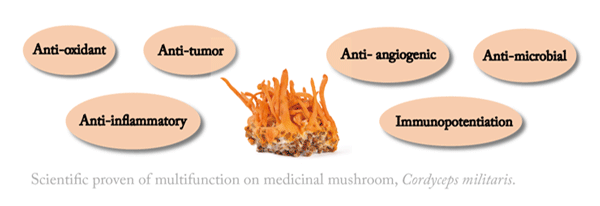
Content sponsored by:
Life Rainbow
Improving immunity and fighting against diseases: Cordycepin
Published: December 2, 2022
By: Life Rainbow Biotech. Contact: Jenny Yu

Medicinal mushrooms have remained an important component of animal culture. The genus Cordyceps is one of the largest genera in the family Clavicipitaceae, containing over 750 species. Cordyceps militaris, an entomopathogenic fungus belonging to the class Ascomycetes, is used extensively as a crude drug and a folk tonic food in East Asia. Studies in the past decade have shown that Cordyceps militaris has multiple pharmacological functions, including anti-oxidant, anti-inflammatory, antimicrobial, anti-tumor, and anti-angiogenic activities and immunopotentiation ability.
Various bioactive constituents from Cordyceps species have been reported, polysaccharides are considered to be one of the major active ingredients in Cordyceps. Previous studies indicate that polysaccharides from fungi enhance the host immune system by stimulating natural killer cells, T-cells, B-cells, and macrophage-dependent immune system responses.
Cordyceps militarist also has a very important active ingredient called cordycepin. Cordycepin is a known unique natural adenosine analogue found. Chemically, the compound cordycepin is 3′-deoxyadenosine (3-dA). Cordycepin molecule is specifically a nucleosidic adenosine molecule that lacks only one hydroxyl group at the 3′ position of the five-membered ring of its ribose moiety. This extreme structural similarity with the cellular nucleoside adenosine renders cordycepin biologically acting on adenosine receptors and very similar to this pivotal nucleoside in all its biological activities in living organisms. The strong antiviral actions of cordycepin are mediated through specific molecular mechanisms that mainly originate due to the extreme structural analogism with the nucleoside adenosine, as this analogism renders the animal biological system unable to recognize this molecule.
Easy-immune® contains cordycepin and polysaccharides from cordyceps as a natural immunity booster. Cordycepin can disturb virus replication by competitive binding due to its nucleoside analogy structure. Because of Cordyceps polysaccharides, Easy-immune® can stimulate immune cells and increase the non-specific immunity in animals. Easy-immune® have many positive results in poultry, swine, and shrimp farming and it can provide the necessary support to animals under intensive farming to fight against pathogen and environmental pressure.
Related topics:
Authors:
Recommend
Comment
Share

Would you like to discuss another topic? Create a new post to engage with experts in the community.
